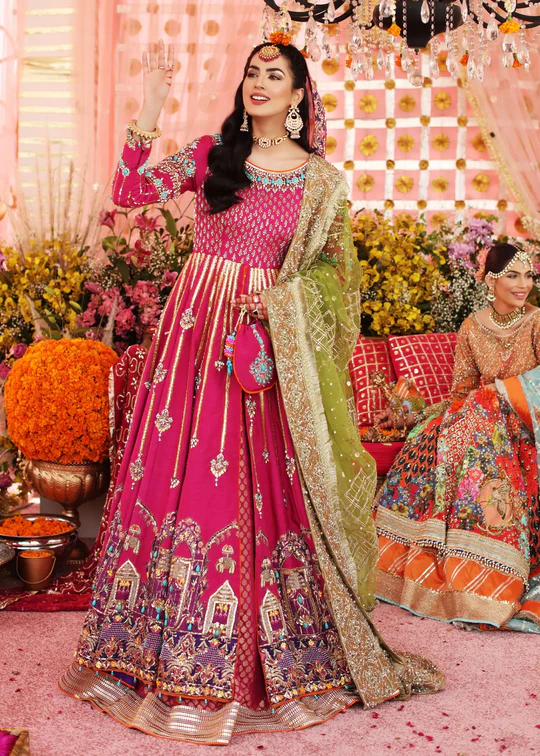Introduction to Farshi Lehengas
Farshi Lehengas are more than just garments; they represent a blend of cultural heritage, luxury, and intricate craftsmanship. As one of the most elegant and regal attire choices for special occasions, these traditional dresses have a rich history dating back to the Mughal era. Today, Rema Ahsan, a distinguished fashion designer, continues the legacy by incorporating luxury and tradition into her Farshi Lehenga collections.
What is a Farshi Lehenga?
The Farshi Lehenga is a traditional South Asian bridal attire, characterized by its long, flowing skirt that trails behind, creating a dramatic and regal effect. The word “Farshi” means “floor-length,” which indicates that the lehenga extends to the floor, often with a train. Its design adds an air of grace and sophistication, making it a popular choice for brides and festive occasions.
Historical Significance of Farshi Lehengas
Originating during the Mughal era, the Farshi Lehenga was once the preferred attire for royalty and aristocrats. Its grandeur was a reflection of the luxurious lifestyles led by queens and princesses, adorned with lavish fabrics and intricate embroidery. Over centuries, it has remained a timeless fashion piece, representing cultural traditions while evolving to suit modern tastes.
The Evolution of Farshi Lehengas
Fashion trends change over time, and the Farshi Lehenga is no exception. However, its evolution has preserved the traditional essence while embracing contemporary elements that make it suitable for today’s fashion landscape.
From Mughal Era to Modern Fashion
During the Mughal period, Farshi Lehengas were a symbol of royalty, crafted from rich fabrics like brocade, silk, and velvet, with ornate zari work. As fashion evolved, designers began experimenting with new materials, colors, and patterns while retaining the lehenga’s traditional silhouette. Today, Farshi Lehengas feature innovative cuts, embellishments, and fusion styles that cater to a broader audience.
Contemporary Trends in Farshi Lehengas
Modern Farshi Lehengas blend tradition with contemporary fashion, incorporating elements like asymmetric cuts, minimalistic embroidery, and unconventional color palettes. Rema Ahsan has played a pivotal role in redefining this traditional attire, making it accessible and relevant for today’s fashion-forward clientele.
Rema Ahsan: The Designer Behind the Magic
Rema Ahsan’s name is synonymous with luxury, elegance, and tradition. Her Farshi Lehenga collections embody these qualities, making them a sought-after choice for brides and fashion enthusiasts.
Rema Ahsan’s Journey in Fashion
Starting her career with a passion for traditional wear, Rema Ahsan quickly gained recognition for her ability to blend classical designs with modern aesthetics. Her Farshi Lehenga collection is a testament to her dedication to preserving cultural heritage while infusing a touch of contemporary style.
Inspiration Behind Her Farshi Lehenga Collection
The designer draws inspiration from historical Mughal art, royal heritage, and the intricate craftsmanship found in traditional South Asian attire. Each piece in her collection tells a story of luxury and tradition, crafted to make the wearer feel like royalty.
Luxurious Fabrics and Embellishments Used
Farshi Lehengas are known for their luxurious feel, achieved through the use of premium fabrics and intricate embellishments.
Traditional Fabrics: Velvet, Silk, and More
The choice of fabric plays a crucial role in the grandeur of a Farshi Lehenga. Velvet, silk, brocade, and chiffon are popular materials used, adding to the lehenga’s luxurious look and feel. The texture and drape of these fabrics contribute to the garment’s elegance and visual appeal.
Intricate Embroidery and Embellishments
Embroidery techniques such as zardozi, gota patti, and threadwork are used to create elaborate patterns on Farshi Lehengas. These embellishments often include gold and silver thread, sequins, and beads, further enhancing the regal nature of the attire.
The Making Process of a Farshi Lehenga
Creating a Farshi Lehenga is a meticulous process that involves multiple stages, from design to completion.
Designing: From Sketch to Fabric Selection
The process begins with conceptualizing the design, sketching it out, and choosing the appropriate fabric. The designer ensures that the fabric complements the design and embellishments to achieve the desired look.
Handcrafted Embroidery Techniques
Once the fabric is selected, skilled artisans employ traditional embroidery techniques to bring the design to life. The intricate handwork adds a personal touch, making each lehenga a unique masterpiece.
Styling Tips for Wearing a Farshi Lehenga
Wearing a Farshi Lehenga is an experience that can be further enhanced with the right styling choices.
Choosing the Right Accessories
Opt for statement jewelry pieces such as traditional jhumkas, necklaces, and bangles to complement the elegance of the Farshi Lehenga. The right accessories can elevate the overall look, adding a touch of sophistication.
Hairstyles that Complement the Look
Pairing the lehenga with hairstyles like loose curls, a bun adorned with flowers, or a braid can enhance its traditional appeal. Hairstyles should harmonize with the attire’s grandness to achieve a cohesive look.
Frequently Asked Questions About Farshi Lehengas
- What Makes Rema Ahsan’s Designs Unique?
- Rema Ahsan’s Farshi Lehengas are characterized by their intricate craftsmanship, use of luxurious fabrics, and the designer’s unique ability to blend traditional elements with contemporary styles.
- Can Farshi Lehengas be Worn for Non-Bridal Occasions?
- Yes, Farshi Lehengas can be styled for various occasions, including cultural events, festivals, and formal gatherings, depending on the design and embellishments.
- How Long Does It Take to Make a Custom Farshi Lehenga?
- A custom Farshi Lehenga can take anywhere from 4 to 12 weeks, depending on the complexity of the design and embroidery work.
- Are Rema Ahsan’s Farshi Lehengas Affordable?
- The price varies based on the design, fabric, and embellishments. Rema Ahsan offers a range of options to suit different budgets while maintaining high-quality craftsmanship.
- How Do I Choose the Right Size?
- It is important to provide accurate measurements for a custom fit. Rema Ahsan’s team can guide you through the process of selecting the right size.
- Is There a Return Policy for Customized Orders?
- Due to the personalized nature of custom orders, returns may not be accepted. However, alterations may be available if needed.
